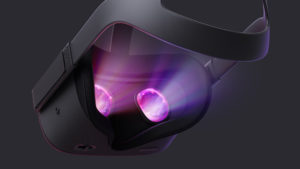Virtual Reality in Healthcare Simulation
Virtual Reality in Healthcare Simulation provides clinical learners the opportunity to experience simulated first-person representations of medical environments, patients, and tasks. Defined in the Healthcare Simulation Dictionary as a virtual representation of an actual patient, which can take many forms, such as software-based physiological simulators, simulated patients, physical manikins, and simulators. Note that here “Virtual Simulation” could represent 2D digital patients on tablets or desktop screens, but “Virtual Reality” specifically represents VR headset-based learning technologies which “fully immerse” the participant in a completely simulated world. Since Covid-19, the development and implementation of virtual reality simulation have seen tremendous growth. Virtual Reality in Medicine is used in Healthcare to allow learners to experience visual stimuli delivered via computer graphics, as well as other sensory experiences. A significant benefit of advancing Virtual Reality in healthcare technology is that Virtual Reality lets students learn how to perform a number of tasks and procedures involving the human body without ever having to practice on a live patient.
Research Support and Application of Virtual Reality into Healthcare Education
Multiple studies and literature reviews have evaluated the effectiveness of virtual reality in healthcare education: nursing, pharmacy, and physical therapy. One skill that can be taught through Virtual Reality is the skill of empathy. Empathy is demanded in situations across the healthcare spectrum, as providers are called upon to deliver bad news or de-escalate an upset patient or family member during sensitive patient interactions. Practicing these conversations using Virtual Reality—and internalizing possible responses and reactions—can help learners prepare for real interactions that will arise within their intended practices.
Sponsored Content:
Saab et al. (2021) Nursing students’ views of using virtual reality in healthcare: A qualitative study is an important study as it identified four themes: a) positive experiences of virtual reality; b) challenges to using virtual reality; c) settings where virtual reality can be implemented; and d) blue-sky and future applications of virtual reality. Participants described this technology as novel, enjoyable, immersive, memorable, and inclusive. Considerations for simulationist to address in their simulation programs based on this study is the suitability of virtual reality for older adults, reported minor technical difficulties, and stressed the importance of prior preparation in the use of the technology. A great opportunity exists to expand the use of VR outside the traditional inpatient clinical setting. Healthcare professionals could benefit from VR opportunities in the outpatient healthcare settings, schools, and the community. Participants suggested using virtual reality in health promotion, disease prevention and management, and to promote nurses’ empathy towards patients.
Choi et al. (2022) Effectiveness of Immersive Virtual Reality in Nursing Education Systematic Review: This literature review indicated that immersive VR increased learning, cognitive, and psychomotor performance. Most participants of the studies preferred using immersive VR in education and with a variety of experiential scenarios. Barriers for simulationist to consider are associated with technological hardware and software. Two of the concerns are simulation sickness and lack of visual comfort if corrective eyewear is required. .
Yang et al. (2023) Pharmacy student’s perceptions, behaviours and attitudes toward virtual reality simulation: this study was conducted with junior and senior level pharmacy students Most pharmacy students had a positive perception that VRS could help them with practical ability, autonomous learning, and theoretical knowledge. This study provides pharmacy simulationists with some points to consider such as the right amount of VR versus in-person learning, the quality of the immersive activity, and linking the VR to the course for measurable outcomes. A positive interaction between the faculty and student, technology improvement, and blended programmatic assessment should be involved to address challenges in implementing VRS courses.
Granier et al., (2023) Use of simulation for education in hospital pharmaceutical technologies: a systematic review: This study looked at the incorporation of VR simulation in hospital pharmaceutical technology education. Some of the simulation experiences used error-based simulations in cleanrooms and preparation sheets for medication with embedded errors. Other interventions to consider is the use of game-based simulations, such as escape games, role-plays, and board games. Virtual reality (virtual cleanrooms and serious games) and augmented reality (AR) is another strategic design for pharmaceutical technology education. VR and AR are interactive and immersive to assist learners. Other simulation interventions to consider for this group of learners is the use of products and props to provide experiential learning opportunities regarding chemical and microbioloical contaminations (fluorescein and quinine tests). This study identified the need to explore education of non-technical skills evaluations for the pharmaceutical technoloy education learners. .
Sponsored Content:
Connelly Ortega et al., (2021) Digital and blended curriculum delivery in health professions education: an umbrella review with implications for Doctor of Physical Therapy education programs: This study identified that digital strategies were found to be at least as effective as traditional strategies for learner satisfaction, attitude, knowledge, and skill. The evidence supports the incorporation of digital strategies as an adjunct to or replacement for portions of a traditional curriculum. The evidence suggests that physical therapy education programs should not abandon all of their recently implemented digital strategies now that the pandemic has ended.
Beshir et al., (2022) Virtual patient simulation in pharmacy education: A systematic review: This review summarises the impact of virtual patient simulation (VPS) on pharmacy students’ knowledge, skills, and perceptions. VPS was used to develop or assess different pharmacy-related skills. VPS significantly improved higher-level learning, counseling, and decision-making skills more than paper-based cases. The favourable impact of VPS on learners’ confidence, student engagement, and satisfaction was noted. VPS enhances knowledge and clinical decision-making skills.
Virtual Reality in Healthcare Resource
Download your free copy of the HTC Vive XR Training Solutions for Healthcare eBook here! From the ebook, clinical simulation champions will learn valuable lessons provided by VR solution developers and medical professionals, including:
- How to account for the lack of standardization of healthcare equipment.
- Which stakeholders to involve to help build the best possible VR solution?
- Navigating the industry’s stringent security requirements to speed up approval times.
- And more!
Several Companies Currently Offer Virtual Reality Solutions for Healthcare
SimX: Seeking to push simulation forward, SimX developed a software system that was the first comprehensive professional-grade VR medical simulation system product available on the market. Founded in 2013 and headquartered in Mountain View, California, the platform allows medical teams to replace expensive manikins with incredibly flexible simulated patients backed by a robust case creation engine.
UbiSim: UbiSim was acquired by Labster. UbiSim is a multidisciplinary Healthcare Simulation company working to combine Nursing Simulation and Virtual Reality for an immersive learning experience. Headquartered in Montreal, Canada, the company’s goal is to make Nursing Simulation more affordable, more accessible, and more realistic than ever. UbiSim offers a complete simulation lab on a flexible platform. This allows users to create and experience realistic clinical situations without needing to access physical Simulation Centers that are often booked months ahead.
Involve XR from Lumeto: Involve XR from Lumeto is an open and flexible learning & assessment platform for institutions looking to deploy data-driven, enterprise-grade, immersive training and assessment across healthcare and public safety sectors. Lumeto is a software development company founded in 2021 to enable the future of work through an advanced XR simulation, training, and skills assessment platform named Involve XR. Involve XR enables enhanced levels of learner assessment and benchmarking, providing learners an efficient way to remotely re-skill, up-skill, and study in live, synchronous, immersive, scenario-based learning environments. Lumeto now offers AI-driven communication in their virtual simulations.
VRPatients: VRPatients is a physiologically-based Virtual Reality Simulation training platform that immerses a healthcare provider or first responder into actual case scenarios. Headquartered in Wilmington, Ohio, the VRPatients Healthcare Simulation training platform allows learners to interview, assess, diagnose, and treat patients in real-time. This technology offers many advantages, such as an enriched sensory experience that improves knowledge retention.
Oxford Medical Simulation: Oxford Medical Simulation (OMS) is a virtual reality platform that delivers quality, evidence-based, and highly realistic simulation. The platform, headquartered in Boston, Mass., assists in efficiently and effectively training healthcare professionals in world-class patient management practices to improve patient care without the possibility of risking real human lives.
MedVR Ed: The COVID-19 pandemic was a setback for healthcare professionals looking to get hands-on training experience. The lack of access to healthcare training centers, combined with a healthcare worker shortage, means that a shortage of 18 million healthcare workers could exist by 2030. The company MedVR Ed aims to address this issue by offering learners the opportunity to perform and practice their clinical procedural skills in a virtual environment. This solution is risk-free and enables countless practice sessions to help boost the confidence of learners. The MedVR Ed system offers in-depth data analytics on user competencies that help pinpoint the key areas that need improvement.
FundamentalVR: Founded in 2012, FundamentalVR is a digital health company that uses virtual reality (VR) and mixed reality (MR) healthcare simulation solutions to help train surgeons using real-world scenarios. The technology and data insight business specializes in the intersection between immersive experiences and haptics, working to enhance medical training and outcomes. Headquartered in London, England, the company provides training and simulation education across medical and communications markets. FundamentalVR is utilized throughout a variety of disciplines, including minimally invasive surgery, laparoscopic, ophthalmology, ENT and neurosurgery. The company’s simulations provide a way to accelerate education, understanding and advocacy across skill training, ranging from technical capability development and rehearsal to clinical shared decision-making.
OssoVR: OSSO VR is a virtual reality surgical simulation training and assessment platform. The company, founded in 2016 in Palo Alto, Ca., is made up of practicing clinicians, professional medical VR simulation developers and medtech industry veterans. To have an impact on patient outcomes, learners need training solutions that measure, compare and improve key performance indicators. This is why OSSO VR specializes in hyper-realistic, haptic-enhanced, hands-on interactivity and design. To open up access to the latest techniques and innovations, healthcare and education facilities need solutions that remotely connect surgeons, sales teams and hospital staff in VP and in the operating room. OSSO VR does just that.
See more VR in Healthcare Simulation Vendors or complete our Find Vendor form.
VR in Healthcare Latest News

Last Day of Virtual Reality Healthcare Products Showcase & Final Chance to Win an Oculus Quest
Sponsored Content:














